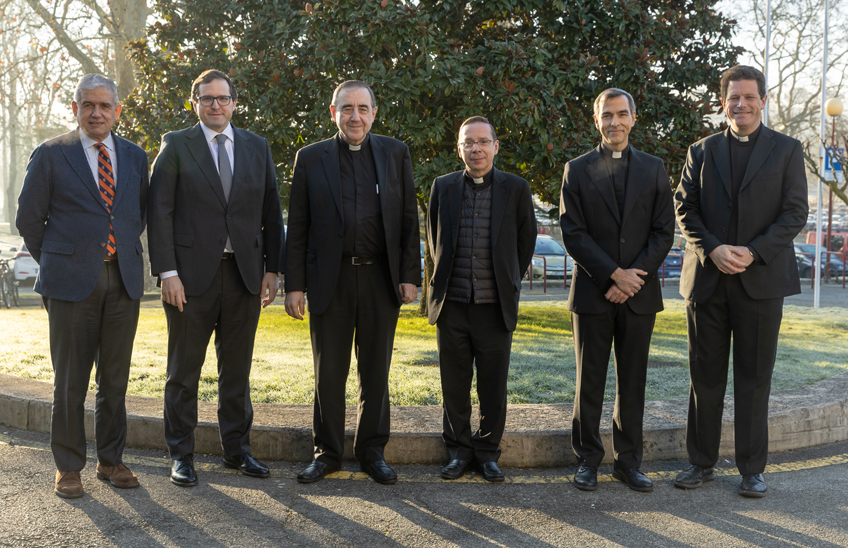Juan Luis Lorda: "We must recognize the formidable value of 20th century Theology".
The University pays tribute to the professor of theology on his 70th anniversary. workshop Mariano Fazio, auxiliary vicar of Opus Dei; Santiago Herraiz, CEO and publisher of the publishing house Rialp; and José Mª Torralba, Full Professor of Philosophy and Politics of the academic center.

FotoManuelCastells/Professor Juan Luis Lorda during his speech.
20 | 01 | 2025
"We must recognize the formidable value of 20th century Theology". This was stated by Professor Juan Luis Lorda, in School of Theology at the University, during the academic workshop organized on the occasion of its 70th anniversary, in which more than 300 people participated.
Mariano Fazio, auxiliary vicar of Opus Dei ; Santiago Herraiz, CEO and publisher of Ediciones Rialp; and José María Torralba, Full Professor of Philosophy Moral and Politics of the academic center.
Juan Luis Lorda, in his speech, underlined the immense gratitude he feels for having been a professor of Theology in such a good "and miraculous" environment as the University of Navarra. He also encouraged those who describe the world in which we live as complicated to look at history.
He gave the opening discussion paper , In Praise of Christian Humanism, in which he reviewed the great masters who dealt with this topic, such as Origen of Alexandria, St. Augustine, St. Thomas or St. John Henry Newman, who share "so many common threads in which a very interesting Christian heritage appears".
He listed some challenges to which Christians must respond today, such as remembering that the God of Christian theology is God revealed in Christ. "If Christ is not the Word, God has not fully revealed himself and his love has not reached us, and we are left without salvation. Therefore, we need a believing reading of the Bible that tells the story of revelation, the story of the covenant and the story of salvation."
"To do this, we must make use of the wonderful intellectual heritage so immense and beautiful that we carry behind us, fruit of the faith and of the work of many Christians of different times. Believers who have known how to dialogue with their times and at the same time with Scripture," he said. And he added: "There is nothing similar in the world with such richness and coherence. That is the meaning of Christian humanism, which is rooted in faith and dialogues with every era," he said.

From left to right, Santiago Herraiz, José María Torralba, Juan Luis Lorda, Bishop Mariano Fazio, Gregorio Guitián and Lucas Buch.
Some challenges facing Christians
He also highlighted other challenges to which "we must respond" with this heritage, such as clarifying the causes of the post-conciliar crisis, reviewing the confrontation of Thomism with the Nouvelle Théologie, not doing without the sciences or political thought, or reviewing the Theology of Liberation, "which provides discernment of the past without the need to judge anyone and with a projection into the future.
The Dean of the School of Theology, Gregorio Guitián, highlighted the effort that Professor Lorda has always made to improve the School , and praised his work to take it to many places "always leaving the flag very high". He also expressed his gratitude in two ways: firstly, for the number of hours he has dedicated to the students, both in his academic work and in the Albáizar; and, secondly, for the number of hours he has dedicated to the students. high school Mayor Albáizar; and, secondly, "for the careful teaching that he has given, in this house and in the rest of civil Schools of the University".
The University and its humanistic character
José María Torralba, Full Professor of Philosophy Moral and Politics and director of the Centro Humanismo Cívico, raised in his speech the existing connection between the University and its humanistic character. "The degree scroll of this discussion paper, The University, home of knowledge and place of friendship, comes from the obituary I was writing on the occasion of the death of the former President, Alejandro Llano, last October. He said that the salvation of the university is in the books, and therefore, the University must be the house of knowledge".
He pointed out that the University is "built on the rock that is wisdom". In this sense, Professor Torralba outlined wisdom as "the radiance that comes in a relationship of love and friendship, which is born by contagion and by the passion that we discover in others. In Christian humanism, this radiance comes from Christ".
"In the finding of the passion for Christ we find service. No one is surprised if I speak of Professor Lorda's generosity in the service of the teaching and the University: as a good university student, he does not settle in and always needs good challenges," concluded José María Torralba.
Christian humanism, present in books
The second roundtable of workshop featured Monsignor Mariano Fazio, auxiliary vicar of Opus Dei, and Santiago Herraiz, CEO and publisher of Ediciones Rialp, in which they discussed reading and how it leads to wisdom.
In his message, Monsignor Mariano Fazio alluded to the letter that Pope Francis wrote last August on the role that literature has in the training of priests: "Reading is a privileged access to the heart of man and for it to bear fruit it must be taken as an exercise of discernment".
In this sense, he stressed the virtues of the classics, those readings that endure over time, that have a universal scope and that "give us instruments to distinguish the good from the bad, the beautiful from the ugly. The classics show that our human nature vibrates with beauty and goodness. If we capitalize truth and beauty, then we are talking about God".
Along the same lines, Santiago Herraiz spoke of the permanence of books, "contents that have been accepted by their anthropological keys by the heart of man", which allow us to approach the Truth.





